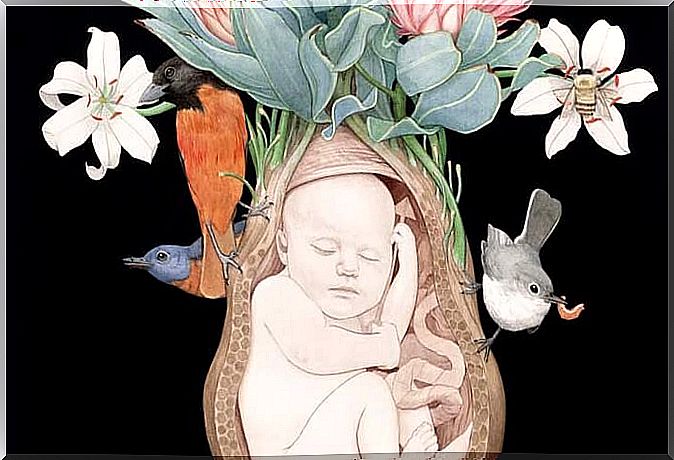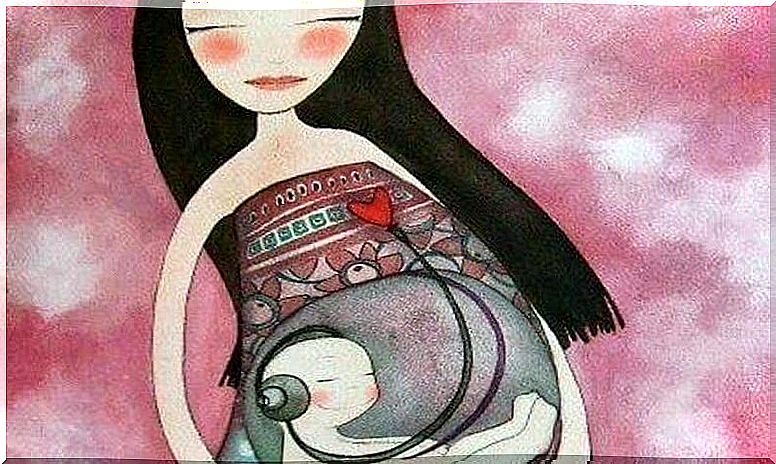Emotional Education From The Womb: Connect With Your Baby

Emotional education from the womb is an exceptional and wonderful strategy with which to promote a better personal balance free of stress and anxiety. In this way, by attending to the emotional world of the mother, the baby is cared for.
If we think about it for a moment we will realize one thing. During a pregnancy we schedule our appointments with the doctor, we take care of our diet, we exercise, we buy things for the arrival of our children and we think about the parenting style that we are going to follow.
Now, and in what way do we attend to our emotions? What happens if the relationship with our partner is not going well or if we are worried about our future work?
Vivette Glover, a perinatal psychobiologist at Imperian College London, explains that there is an intimate and powerful relationship between the mother’s emotions and the way the fetus grows in the womb.
When emotions cross the natural barrier of the placenta
Many times, we are not aware of it, but pregnancy is much more than a hormonal, emotional and physical revolution. We are often sold the idea that pregnancy is wonderful, that it will undoubtedly be the best time of our lives, but not all women live it that way.
Months of changes and discomfort
After conception, the woman’s organs migrate to other areas to allow cell proliferation and specialization that transforms all these specialized tissues, little by little, into a baby. All these changes occur with discomfort, of greater or lesser intensity.
Due to the high levels of the Human Chorionic Gonadotropin (HCG) hormone, vomiting and discomfort appear that can last perfectly until the 16th week of pregnancy in many cases.
We attend to our body but not our emotions
Experts in perinatal psychology warn us of this risk: the mother’s emotional world needs to be addressed during pregnancy.
Ultrasounds, blood tests, and diet are necessary, but so is knowing if the woman is suffering from stress, anxiety, or covert depression.
In an interesting book published by the perinatal psychobiologist Viviene Glover: Perinatal and Postnatal Depression, she explains an interesting study that was carried out at the “Imperian College London”, where the gestation of 14,000 pregnant women was monitored.

- Their anxiety levels and the indicators associated with possible depression were attended to.
- Later, once they gave birth, these children were followed for 5 years.
- It was discovered that there is a positive relationship between a pregnancy experienced through depression or stress and attention deficit with or without hyperactivity.
Emotional education through the placenta
We all have the idea that the placenta is that insurmountable layer that protects the fetus from all risks. Moreover, many mothers think that worries, that their problems at work, family, partner or that specific anxiety do not have to affect their baby.
It is not true. To understand it better, let’s think about a stressful situation, which for whatever reason, repeats itself day after day.
- In a stressful situation, the hypothalamus produces and releases the hormone called CRH, which subsequently generates cortisol.
- If the stress is chronic throughout all the months of gestation, the natural barrier of the placenta will not be able to cope with so much cortisol in the blood, it will cross it until it reaches the fetus. This is when the baby also goes into “alertness” due to these unfavorable biochemicals.
We must become aware of this reality and implement changes, new habits, new ways of managing our emotional world. Take note of how to take care of this aspect from the time the baby is in the womb.
How to connect emotionally with your baby

There are several types of lessons that can be useful to us. However, and first of all, we must be clear about one aspect: for the baby to be well, we must be well.
If you see your reality as a stage full of circles that overwhelm and pressure you, keep your distance from them. In these months the most valuable circle is the one that surrounds you.
- Practice yoga and meditate. These activities help you to be aware of the here and now. Only when we connect with ourselves in an effective way can we connect with our baby.
- Perform gentle massages on your belly. Do not hesitate to make your partner participate in it. You can use essentials or lotions with a pleasant aroma of your preference. The purpose is to let the baby know that he is loved, that his mother is happy and feels calm.










